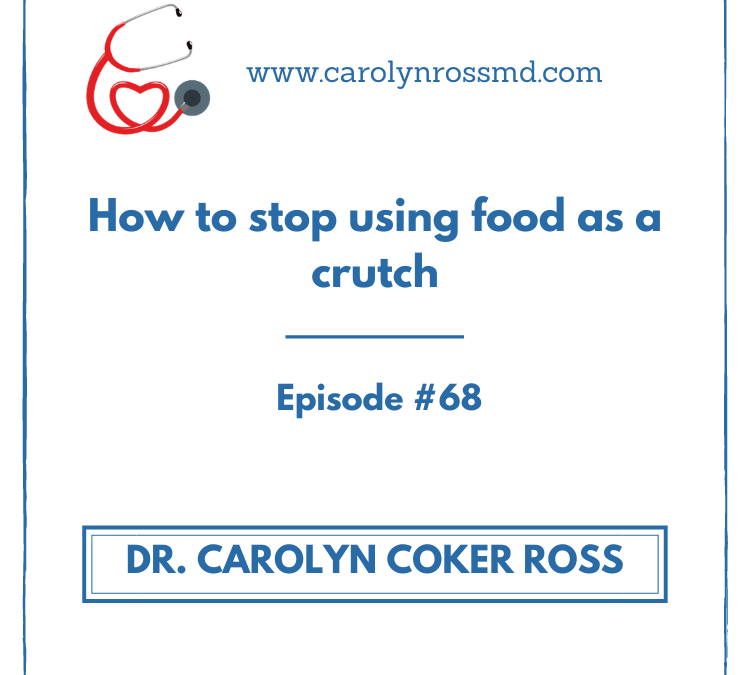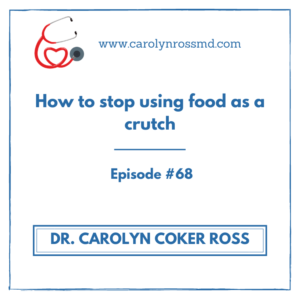If you’ve been using binge eating, emotional eating or food addiction behaviors or body dissatisfaction as a way to deal with your stress, emotions or to deal with underlying childhood beliefs of unworthiness or unlovability, it is hard to change. Want to know how to deal with stress and food cravings? Want stress relief, food addiction help and an end to emotional eating. Listen in.
In this episode, you will learn:
1. How to deal with emotions without using food as a crutch.
2. Specific actions you can take to deal with stress without using food as a crutch.
3. Why your body is the result not the cause of your problems.
STUDY GUIDE : HOMEWORK
1. List situations in your life that are stressful. Some examples might include:
– loneliness
– dissatisfaction at work
– relationship issues (relationship with parents, siblings, partner / spouse, friends)
– parenting concerns and fears
– financial
– other – add in any other stressful situations in your life right now
2. For each of these situations, make a list of behaviors you have around food that you are recognizing are a response to these life stressors. For example: I was laid off from work and have been worried about finding another job. Looking back, I’ve noticed that I’ve been eating lots of junk food “because it’s cheaper” but really because of wanting to be comforted.
3. List 1 statement (affirmation) you can say to yourself the next time you “feel fat.” For example: I can ask myself “what are you really feeling?” or I can remind myself that I can use another skill to deal with stress rather than food or body hatred.
Schedule free Anchor Program consult: https://findingyouranchor.as.me/consult
Here is the link to my #TEDxPleasantGrove talk on intergenerational trauma: https://youtu.be/ljdFLCc3RtM
Hi everyone Dr. Carolyn here. Today we’re going to be talking about “How to stop using food as a crutch”. Now, if you’ll remember couple weeks ago, I talked about how, you know, body image issues. In other words, feeling fat are cover up for deeper issues and that the problem is really not your body. Your body is really the result of the problem, not the cause of the problems. Take a minute, to let that settle in your body is not the problem, it’s the result of the problem. The cause of the things you don’t like about your body really are result of all the emotions that you’ve been pushing down and the behaviors like binge eating, assessing about food, emotional, eating that you’ve had to use to keep yourself from feeling and dealing with these emotions and situations in your life.
So remember, I showed you that often when we look in the mirror or do body checks on our body and we say, I feel fat today. We’re seeing that as something that just comes out of the blue and hits us and it’s over here and we never connect that what’s how we’re feeling about our body has a relationship to what’s going on in our lives, or maybe something that’s happened when you were even younger or a child. But the point of this whole conversation is if they, they are integrally intertwined. So it’s important to not just see, see this as a separate thing. I feel fat and ignore the fact that I feel fat as a result of not dealing with those life problems. So if you get that, the next question would definitely be how can you stop using food or body image issues as a crutch?
So, you know, for those of you who are engaging in binge-eating, have identified yourself as having food addiction or emotional eating, or you’re constantly hating on your body as a way to deal with stress emotions, or even underlying beliefs that come from childhood adversity, such as I’m not worthy and all that we know it’s hard to change. This isn’t easy, but you know what? Most of you have spent upwards of 20, 30, sometimes 50 years being on and off diets and trying to fix your body. How has that really worked for you and how much money, how much time, how much energy has it taken up in your life? So maybe if you consider that you might recognize you’ve already been through the hard stuff. You know, it’s hard to go on a diet. It’s hard to stay on a diet. It’s hard to feel like a failure when you regained the weight that lost on a diet. But the big question is if you’ve been using food and your food behaviors and your body hatred to deal with your emotions, how are you going deal with your emotions without food? Well, I’d like to offer you just a few recommendations to get you thinking. And these come from my book, the emotional eating workbook, and I’ll put a link to that in the show notes for you. So these recommendations have to do with just focusing on de-stressing your life right now. I mean, as we’ve talked about multiple times, there are so many layers to, binge eating, emotional eating, food addiction. This is just one layer and that has to do with how you deal with stress.
So starting with number one, one way of dealing with stress is eating foods that are higher and B vitamins. The B vitamins are the stress reducing vitamins. So these are foods like asparagus avocados, green leafy is like kale, spinach, collard greens. Also adding garlic to your diet can help. Use nuts as a snack and eliminate alcohol and caffeine for at least a week. And see if that feel that helps you with stress. Now, if you, at that place in your food journey that you don’t like vegetables or you don’t like green leafy vegetables. Well, go out and buy it a B complex vitamin and take that. Because if you’re not eating those particular foods, you’re probably deficient in some of the B vitamins.
Number two, use this affirmation when you start having negative thoughts about your body. So I’ll put the affirmation in the show notes so that you can copy it, put it on a sticky on your mirror, in your car, somewhere private at work and just say this to yourself when you have those negative thoughts come up and the affirmation is “Today I create a stress free world for myself. When I let my thoughts come from the loving space of my own heart, where forgiveness and non-judgment emanate. So today I create a stress free world for myself when I let my thoughts come from the loving space of my own heart, where forgiveness and non-judgment emanate.” So that’ll be in the show notes for you.
Number three, practice using this skill, which we call self-soothing using the five senses. This helps with stress reduction, for example, put lavender scented lotion on your skin. Listen to a relaxing music or saver a relaxing bath, a bubble bath or spend time in nature. So just again, make a list of things that you feel you’d like to try to help deal with your stress as you let go of food as a crutch.
Number four, finally focus your mind to focus your mind. You’ve got to quiet your mind, cause I know a lot of you have busy minds. I’ve heard some of those busy thoughts on the consults that I’ve done with you. So to quiet the mind, sit quietly for 60 seconds. Yeah. It’s just a minute. Nobody’s asking you to meditate. Take for 20 minutes or 30 minutes or an hour. Okay. We’re talking one minute people and allow your thoughts just to pass by and your mind to become quiet. So allow your thoughts to be kind of like a leaf on a stream. They just go in front of you, but you don’t have to stop those leaves and pick it up and examine it and what what’s, what am I doing? Why am I doing this what’s happening, blah, blah, blah. Just let those thoughts go for one minute and then increase the time by one minute, each day. And you, you know, maybe, I mean, some people find it even just a minute, helps five minutes helps. It’s better than no minutes.
Other ways to manage stress, include physical activity and again, we’re not talking about exercising to lose weight. We’re talking about physical activity, which helps reduce your stress levels, walking, anything that takes you in nature. If it’s not too hot where you are right now or waiting until you know, it’s dusk or the temperature cools maybe, or early in the morning and learning to self soothe you without food. That’s one way to do it. I think of also drinking ginseng tea. I love ginseng tea and ginseng is what we call an adaptogen and an adaptogen is, is an herb that helps your body deal with stress. So getting some of that good ginseng tea. And when you have a stressful afternoon, you can put it on ice or drinking warm. However, it works for you.
Again, no change in behavior is easy. Nobody’s saying that, but it, all it does take is practice and patients, if you grown up on diets, then you may be one of those people who expects a quick fix and therefore you get frustrated if things don’t change in a month or three months. This is, I’m talking about a totally different kind of journey, a journey that lasts for your lifetime. Not something that’s just going to be a quick fix. So I’m advising that you just pick one of the suggestions above and try it for a week and then try another one and then keep practicing the ones you’ve tried. And over time, you’ll recognize that your reliance on food as a crutch. Well, or you’re using body image issues as a distraction from your emotions will lessen.
Finally, I’m just asking you to give us some positive comments for my YouTube channel, uh, subscribed to the YouTube channel so you can get notification of coming videos and to let you know that next week, um, we’ll also be hosting another anchor program graduate who will talk about her experience in the program and how she gained freedom from binge eating and compulsive eating. So if you’d like to delve into other ways to make peace with food and your body feel free to schedule a free consult to discuss your individual food and body image issues and I will put that link in the show notes as well. Thanks for watching.









